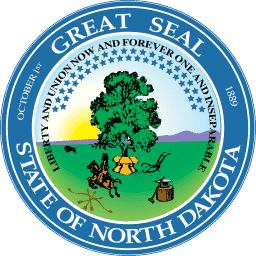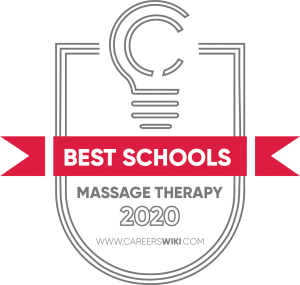…
There are three massage therapy schools in North Dakota. One is a state college and the others are privately owned institutes.
Most students pursue certificates, which take nine months or less to complete. One school offers an 18-month associate degree. Programs involve classes, labs, and real-world experience in clinical settings. Successfully completing a program qualifies a graduate to take an exam for state licensure.
Employment prospects for massage therapists in this state are promising. About 40 annual job openings are expected during the decade ending in 2026.
Click here to view the full list of best massage schools in U.S.

This government agency’s goal is to ensure “public safety” by preventing “unscrupulous and poorly trained people” from practicing in the field.
The board establishes educational and examination requirements for therapists, issues licenses to them, and enforces guidelines for license renewal and continuing education. The panel sets standards for schools’ curricula and faculty, approving institutions that meet the criteria. The board also inspects massage businesses.
The governor appoints five board members, including three licensed massage therapists, one instructor, and one person who represents consumers.
To become a massage therapist in North Dakota, a student must enroll in an accredited postsecondary institution with a massage therapy program that the state board has approved. Postsecondary institutions require applicants to have high school diplomas or GEDs. Health, science, and business courses in high school help prepare prospective practitioners for further studies.
The board mandates that a program provide at least 750 clock hours of instruction and training. This must include 150 hours of classes in anatomy, physiology, and kinesiology; 40 hours of pathology; 130 hours of introductory massage therapy coursework; 10 hours of CPR and first aid; 175 hours of hands-on clinical experience; and 50 hours of business, ethics, and career development.
Students are expected to learn massage therapy theory, contraindications, sanitation, and disease prevention. Programs vary in the types of massage techniques they teach. Some provide more clinical practice than others. The board stipulates that licensed, experienced healthcare professionals with master’s degrees teach all classes.
Graduates apply to the board for licenses to practice in the state. One of the licensure requirements is to pass the Massage & Bodywork Licensing Examination (MBLEx). The Federation of State Massage Therapy Boards (FSMTB) approves applications to take the test at a Pearson VUE assessment center.
Practitioners have to renew their licenses every two years. This involves receiving 24 hours of continuing education, 12 of which must be hands-on classroom training. No more than 10 hours may be earned online. For the first renewal, the board requires three or more hours of ethics education.
We selected the schools below based on the programs that they offer, accreditation, student population, graduation rate and reputation.
View our Ranking Methodology to learn more about how we rank schools.

75%
53
Established in 1949, this institute offers a massage therapy program on its campuses in Fargo and Grand Forks.
The 750-clock-hour curriculum provides the state-required coursework, with 300 hours of “practical instruction.” Students spend 35 hours per week in classes or clinics for 22 weeks. The program starts three times annually at both locations.
There are numerous opportunities for hands-on experience — at community events, career fairs, and competitions. In an on-campus salon, students administer basic, chair, and hot stone massages to actual clients. The school hosts national educators and local industry leaders, who help students explore career possibilities.
82%
108
This private school offers a massage program that exceeds state standards.
The 900-clock-hour curriculum involves 27 hours per week for 34 weeks. Program participants learn Swedish, deep tissue, sports, and prenatal massage techniques. They also receive communication skills training, give massages to the public in a student spa, and get assistance in finding jobs.
The school maintains a 100 percent acceptance rate, but class sizes are limited. Tuition covers books and a student kit, including a new iPad. Classes start in November, March, and July. The dress code is “black street clothing and shoes.”
39%
1124
A public community college in the city of the same name, WSC has two massage therapy programs. Earning a certificate requires completing 848 clock hours (31.5 credits) in nine months. The coursework covers all state-mandated subjects.
The 18-month associate in applied science degree program consists of 1,193 hours and 62 credits. It features the same courses as the certificate curriculum, plus Interpersonal Communication, College Composition, Contemporary Nutrition, Introduction to Psychology, and other classes.
Students learn trigger points, counterstrain, muscle energy technique, sports massage, PNF, traditional Chinese medicine, essential oils, heats and colds, lymphatic drainage, craniosacral, Ayurveda, and reflexology.
$20
$38,000
20%
The median income for a North Dakota practitioner is nearly $38,000 a year or about $18.25 per hour. That is less than the national average of more than $41,400 or around $20.
The pay is almost $62,000 or about $29.80 for the state’s top 10 percent, not as good as around $78,300 or $37.60 nationwide. The bottom 10 percent make about $19,500 or $9.40 in North Dakota, and over $21,300 or about $10.25 nationally.
The state had 340 massage therapists in 2016. The total will be 410 by 2026, according to the U.S. Bureau of Labor Statistics. That 20 percent rate of growth would be slower than the predicted national median of 26 percent.
Sources: U.S. Bureau of Labor Statistics, CareerOneStop

LIMITED TIME DEAL